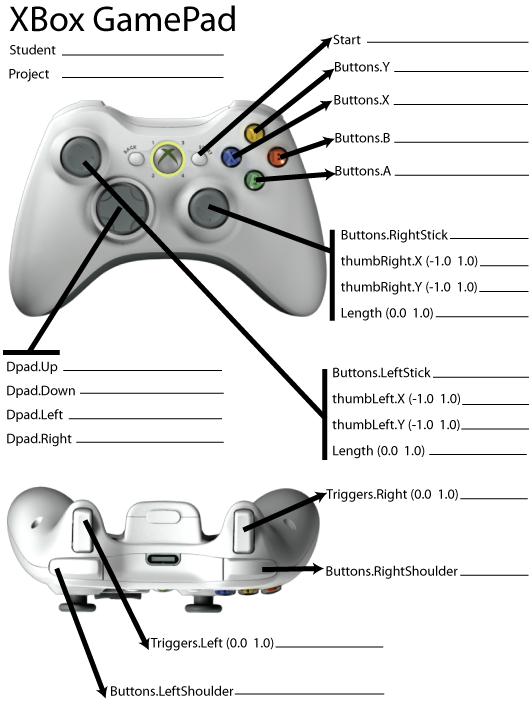Difference between revisions of "Game Programming Class2"
(→Inclass Keyboard input demo) |
(→Homework) |
||
| Line 137: | Line 137: | ||
==Homework== | ==Homework== | ||
*XNA Picture With Update | *XNA Picture With Update | ||
| − | :Update | + | :Update your picture to include some movement with the update method. Use the keyboard or mouse to interact with something on the screen |
| − | + | ||
| − | |||
*Read Chapter 2 in XNA 3.0 | *Read Chapter 2 in XNA 3.0 | ||
*Read Chapter 4 in XNA 3.0 (yes we skipped 3 we'll come back) | *Read Chapter 4 in XNA 3.0 (yes we skipped 3 we'll come back) | ||
Revision as of 20:08, 30 January 2011
Contents
Fonts
free game fonts XNA Redistributable Font Pack
note this font pack is now included in XNA 4
SVN Checkout
All of the examples for this class and the basic game library we wil be building is in our SVN repo this week we'll practice checking out a folder from the repo.
https://iam.colum.edu:8443/svn/XNAProg/trunk/Jeff
in class
Spritefont demo
IntroFonts/Game1.cs IntroFonts.zip
XNA Structures
Game Class
The XNA Game class has two private properties
- GraphicsDeviceManager graphics;
- ContentManager content;
//the game constuctor can be used to set some graphics settings. graphics.PreferredBackBufferHeight = 768; graphics.PreferredBackBufferWidth = 1024; //graphics.PreferredBackBufferHeight = 1080; //graphics.PreferredBackBufferWidth = 1920; //graphics.IsFullScreen = true;
- Declare SpriteBatch spriteBatch;
- Initialize()
- LoadContent()
- UnloadContent()
- Update(GameTime gameTime)
GameTime
FrameRate and GameTime
Time and Timespan
Example of update using GameTime to calculate elapsed time
- IntroSimpleSpriteUpdateWindows.zip
- IntroSimpleSpriteWindows/Game1.cs
Understanding GameTime We'll revisit game time when we talk about performance profiling.
- Draw(GameTime gameTime)
Console And Trace
We will build a console class later and debug in game.
Texture2D and SpriteBatches
About textures and Batching
Displays, ViewPorts, Client Bounds
Alpha channels
Demo
SpriteBacth
demo project
- IntroSimpleSpriteBatchOptionsWindows.zip
spriteBatch.Begin();
- Options SpriteBlendMode
- Additive Enable additive blending. http://blogs.msdn.com/etayrien/archive/2006/12/19/alpha-blending-part-3.aspx
- AlphaBlend Enable alpha blending. http://blogs.msdn.com/etayrien/archive/2006/12/19/alpha-blending-part-2.aspx
- None No blending specified.
Other Projects
IntroSimpleSpriteUpdateGravityWindows.zip IntroSimpleSpriteUpdateWindows.zip
Inclass Keyboard input demo
KeyboardState keyboardState = Keyboard.GetState();
Input
input from Game Controller and Keyboard
XNA has built in support for up to 4 game controllers. The default controller is a x-box controller. X-Box Controller The Controller is accessed through the GamePad Object and the GamePadState Structure reference types <csharp>
//Get an instance of the gamePadState Structure
GamePadState gamePad1State = GamePad.GetState(PlayerIndex.One);
/*Since the Keyboard structure is Windows only we need to use some preprocessor directives to only compile the KeyBoard state code if the target is not XBOX360 (I should also add zune if this is one of our build targets)
- /
#if !XBOX360
#region KeyBoard
KeyboardState keyboardState = Keyboard.GetState();
#endif
</csharp>
Angle Measured in Radians
using atan2 to get the angle from the direction vector
Vibration
<csharp>
GamePad.SetVibration(PlayerIndex.One, 1.0f, 1.0f); //left low freq motor right high freq motor
</csharp>
Homework
- XNA Picture With Update
- Update your picture to include some movement with the update method. Use the keyboard or mouse to interact with something on the screen
- Read Chapter 2 in XNA 3.0
- Read Chapter 4 in XNA 3.0 (yes we skipped 3 we'll come back)
